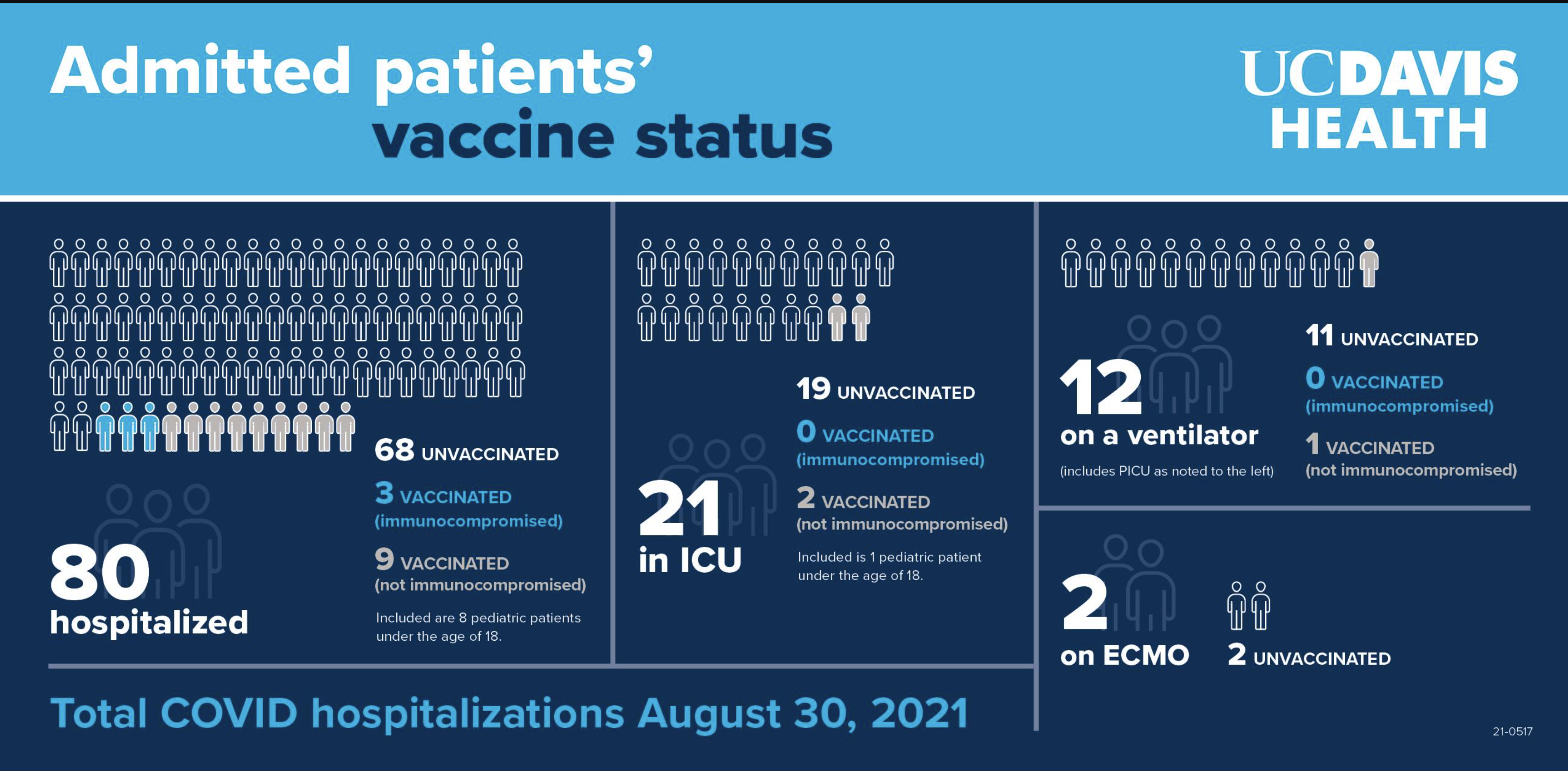Breakthrough infections and masks

Source: University of California Davis Medical Center
The only certain things in life are death and taxes.
Vaccines against COVID-19 may not be perfect (no vaccine is) but they are a very, very good bet. During initial clinical trials, the mRNA vaccines made by Pfizer and Moderna were basically 100% effective at preventing death, and almost as good at preventing symptomatic infection.
Two things have changed since then to reduce those absolutely spectacular numbers. First, we are now looking at a data set of hundreds of millions of people rather than tens of thousands. More importantly, the vaccines have a new foe: the delta variant. Delta is many times more contagious than the variant that came out of China in 2020.
So let’s emphasize a couple of key points first.
- As I showed in my previous posts (here and here), vaccines are keeping people out of the hospital. About 90% of hospitalized COVID patients are unvaccinated, and of the remaining 10%, a fair number are immunocompromised (their immune system cannot respond properly to a vaccine).
- In the grand spectrum of vaccines in general, the two American mRNA vaccines are staggeringly good. Brilliant science, great effort, and a lot of luck brought them to market in record time. For comparison, a novel vaccine against HIV / AIDS using the Johnson & Johnson technology was just abandoned after a clinical trial showed it just doesn’t work. {STAT News; Am.Chem.Soc} We are very, very fortunate that we have excellent vaccines against this pandemic virus.
Breakthrough infections
At hubby’s hospital, some coworkers who are fully vaccinated have tested positive for coronavirus infection. At least one had a symptomatic infection with a nasty fever for a day. My personal anecdotes match the public information: so-called breakthrough infections do happen.
Here’s what the CDC says about coronavirus infections in fully vaccinated people:
- Some breakthrough infections are expected. COVID-19 vaccines are effective at preventing most infections. However, like most vaccines, they are not 100% effective.
- Fully vaccinated people with a breakthrough infection are less likely to develop serious illness than those who are unvaccinated and get COVID-19.
- Even when fully vaccinated people develop symptoms, they tend to be less severe symptoms than in unvaccinated people. This means they are much less likely to be hospitalized or die than people who are not vaccinated.
This final point is important to understand:
- Fully vaccinated people with Delta variant breakthrough infections can spread the virus to others.
- However, vaccinated people appear to spread the virus for a shorter time.
{Source: CDC}
Some anti-vaxx, anti-mask people take this point about transmission and argue that it shows “vaccines don’t work.” I guess it depends on what you mean by “work.” For vaccines, there are many definitions, but the most important one is LIFE SAVING.
Unfortunately the upshot is that in certain circumstances, it’s best for even fully vaccinated people to wear a face mask in order to minimize their chance of unknowingly spreading the virus to other people.
When should I wear a mask?
Obviously you should wear it when required by law, policy or custom (such as airplanes). Otherwise, here are the current CDC guidelines https://www.cdc.gov/coronavirus/2019-ncov/prevent-getting-sick/about-face-coverings.html
- In general, no masks outside. Exceptions: large gatherings or close contact with others who may not be vaccinated.
- If you’re not vaccinated or are immunocompromised, you should mask in indoor public spaces
- If you’re fully vaccinated, to maximize protection from the Delta variant and prevent possibly spreading it to others, wear a mask indoors in public if you are in an area of substantial or high transmission. The CDC has a map of their definition of “high transmission.” Currently that is 95% of US counties, but it will change. Check your county here: https://covid.cdc.gov/covid-data-tracker/#county-view
If I’m fully vaccinated, should I be afraid of breakthrough infection?
In my opinion, No. That is, unless you are afraid of other risks of daily living, such as car crashes or the flu. I personally have been to a movie theater, a live performance theater, and on an airplane in the last two weeks. I wore a mask at each. There are confounding issues, of course. If you or someone you live with is immunocompromised, that’s a bigger risk.
The level of virus transmission in your community matters A LOT. Right now, that may be relatively high. But I think that is going to change soon for most places in the US. Learn to adjust your behavior—and your worry—to match what’s happening out there. Be flexible, and be happy that you are one of the privileged humans protected by a vaccine.
Breakthrough infection % will increase with vaccination rate
What?? More vaccines = more breakthrough infections? This is the kind of thing the anti-vaxxers love to repeat, and people who aren’t fluent with math will fall for it. But think about it for half a second: If 100% of Americans were fully vaccinated, then 100% of any new COVID infections would be breakthrough infections. Of course, there would be far fewer of those infections than if half the people were unvaccinated.
I bring this up simply to prepare you that in coming months as more and more of us get vaccinated, the total percent of symptomatic COVID cases (including hospitalizations) in fully vaccinated people should go up. The total number of such cases should go down.
Next: Variants and the future of the pandemic. Then, booster shots and antibodies
Have you been vaccinated yet? Every American age 12 and up is now eligible.
In California, visit https://myturn.ca.gov/ to find appointments for a FREE vaccine near you.
Amy Rogers, MD, PhD, is a Harvard-educated scientist, novelist, journalist, and educator. Learn more about Amy’s science thriller novels, or download a free ebook on the scientific backstory of SARS-CoV-2 and emerging infections, at AmyRogers.com.


